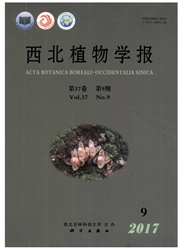

 中文摘要:
中文摘要:
以刺槐(Robinia pseudoacacia)幼苗为材料,采用盆栽控水方法研究了春季、夏季和秋季干旱及旱后复水对刺槐幼苗可溶性糖含量的影响。结果表明:土壤水分胁迫程度对夏季刺槐幼苗可溶性糖含量影响显著,并且当土壤相对含水量低于52.16%并继续下降时可溶性糖含量迅速升高,而其对春季和秋季幼苗的可溶性糖含量影响不显著;春季和秋季不同胁迫历时处理间刺槐幼苗可溶性糖含量差异不显著,而夏季土壤相对含水量为52.16%和40%处理的可溶性糖含量显著高于对照;相同水分胁迫条件下不同季节刺槐幼苗可溶性糖含量总体表现为:秋季〉春季〉夏季。干旱复水后春季刺槐幼苗可溶性糖含量持续下降,而夏季呈现先升高后降低的趋势,秋季呈现一定波动性,变化幅度不明显。研究发现,刺槐幼苗可溶性糖含量在干旱及复水调节下的变化不仅受土壤水分胁迫强度和胁迫时间的影响,也与植物所处的生长季节有密切关系。
 英文摘要:
英文摘要:
A pot experiment was conducted respectively in spring, summer and autumn, simulating different drought environments to study the effects of drought and rewatering on soluble sugar content in seedling of Robinia pseudoacacia. The results showed that the soil water content had significant effects on soluble sugar in summer,but no significant effects in spring and in autumn. And the soluble sugar content increased quickly with the declining of soil water when relative soil water content (RSWC) was under 52.16%. The soluble sugar content has no significant differences between different stress durations in spring and in au- tumn. But in summer,the soluble sugar content under treatment of 52.16% and 40% of RSWC had significant increase compared with CK. In different seasons,soluble sugar content ranged autumn〉spring〉summer on average. After rewatering, the content of soluble sugar declined in spring,increased initially and declined later in summer,and in autumn fluctuated in the level. The study showed that soluble sugar was affected by soil moisture and stress duration, and also had important relationship to growing season.
 同期刊论文项目
同期刊论文项目
 同项目期刊论文
同项目期刊论文
 期刊信息
期刊信息
